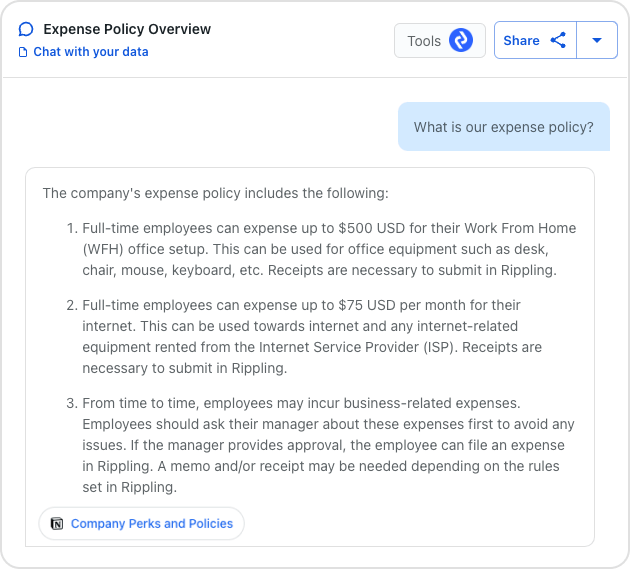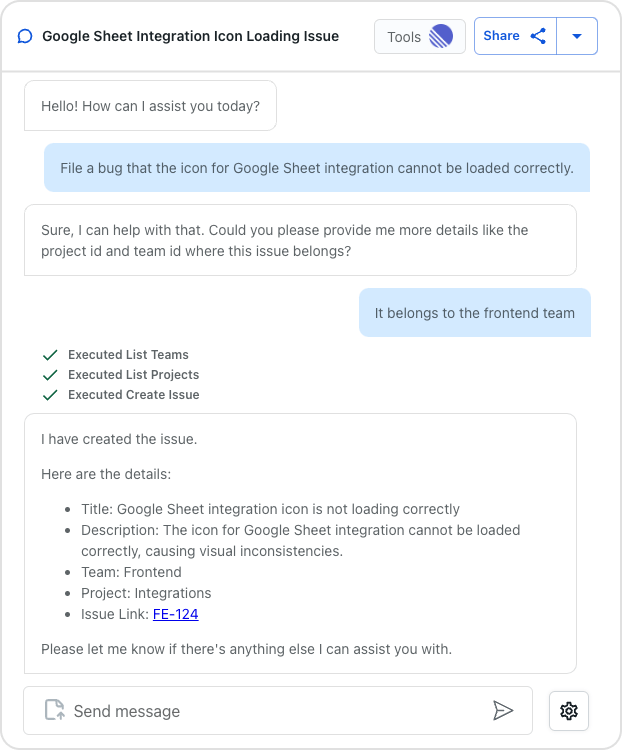Every day in the year 2024 is filled with AI-related news. But Jamix, a new San Francisco-based enterprise AI startup founded by former Instagram and Airbnb engineers, is hoping to cut through the noise by focusing on solving a very particular, yet widely-shared problem: allowing companies to use generative AI assistants without compromising their data privacy and security.
Jamix offers what it says is a secure, model-agnostic AI assistant designed to enhance workplace productivity.
Last week, it emerged from stealth with $3 million in pre-seed funding led by Audacious Ventures, with contributions from angel investors including Keith Peiris (CEO, Tome), Chris Prucha (Co-founder, Notion & Origin), Oleg Rogynskyy (CEO, People.ai), Nate Smith (Founder, Lever), Bobby Lo (Founder, Vurb), Zac Altman (Founder, LoungeBuddy), Neha Sampat (CEO, Contentstack), Nishant Patel (Founder & CTO, Contentstack).
“Most companies don’t really have the resources to build a sophisticated tool like this,” said co-founder and CEO Matt Zitzmann, in an exclusive video call interview with VentureBeat last week. “That’s the gap we’re striving to fill in this market, to help companies have their own custom, internal version of ChatGPT or an AI assistant that protects people’s data.”
VB Event
The AI Impact Tour – NYC
We’ll be in New York on February 29 in partnership with Microsoft to discuss how to balance risks and rewards of AI applications. Request an invite to the exclusive event below.
Zitzmann and his co-founder Conglei Shi, who serves as Jamix’s Chief Technology Officer (CTO), know the enterprise software space well with resumes at some of the biggest names in tech: Zitzmann worked at Google, Instagram and its parent company Meta, which acquired his former company Kamcord. Shi worked at IBM on its Watson AI team and later at Airbnb.
Enhancing workplace productivity while maintaining security
Jamix’s philosophy is simple: “For AI to really reach its full potential, it needs to be connected to your data, your apps, and your APIs,” Zitzmann told VentureBeat.
He noted that while companies may try to use AI tools without exposing their data with the good intention of keeping it secure and safe, this actually severely limits the capabilities of AI to meaningfully improve and grow their business.
Zitzmann posed a hypothetical situation about a company hiring a human intern, but not giving them access to any of the firm’s corporate information.
“That intern is not going to be very effective, right?” Zitzmann asked rhetorically. “That’s effectively what AI is today.”
Instead, Jamix’s approach is to allow its AI assistant to be integrated into a firm’s existing, commonly used workplace software apps such as Google Workspace or Notion, and messaging apps including Slack, and provide information back to the user on demand.
This allows Jamix to perform three broad categories of tasks for enterprises:
The first is earch across apps: instead of having the user toggle back and forth for a piece of information they’re looking for, the Jamix search bar returns results from across all the different apps it is connected to via API backends, be it an email application, Slack or Google Docs, allowing the user to see and access that information more quickly and easily. Jamix refers to these as the enterprise’s “data sources.”

“For 20 years now, there’s been this idea of enterprise search, where you have on search bar that is like Google for all your corporate data,” Zitzmann explained. “This solves the pain point of ‘I know it’s somewhere, but I don’t know if it’s in my Gmail, Slack, or a Google Doc.’”
The second is “chat with apps and data,” according to Zitzmann. This takes the common early generative AI use case of uploading a PDF and being able to engage in a conversation with an AI tool such as ChatGPT to surface specific information or summarize it, but expands it to all the documents that a company wants its employees to be able to access.

As an example, Zitzmann said users can ask its AI assistant hooked up to a recruiting application “how many candidates do we have in the engineer pipeline, how many offers have we made, how many have been declined?” and receive the answers without having to go hunt through the app itself to find them.
Finally, in arguably the most ambitious part of the offering, Jamix is allowing its AI assistant to “initiate actions” on the user’s behalf within their workplace apps, essentially acting as an AI agent to file bug reports or evaluate incoming resumes to a particular job listing based on how well they match the job listing criteria. Another function is summarizing information from URLs.

All of these functions aim to save time and reduce the manual effort required in daily tasks.
Committed to user privacy and security
Yet, by the same token, Jamix retains a commitment to user privacy by encrypting all its customers’ data and inking agreements with AI model providers, including OpenAI for ChatGPT and GPT-3.5/4, to not train on Jamix user data.
In so doing, Jamix’s AI assistant aims to address key concerns surrounding data security in the integration of AI into workplace operations.
“The contractual agreement we have with those [AI model] providers is they’re not allowed to train on that [customer] data,” Zitzmann said.
For customers who are still more concerned with closed model providers, Zitzmann noted that Jamix works with open source AI models as well, allowing its enterprise customers to run the AI assistant on their own private clouds or on premises.
Jamix’s commitment to model agnosticism allows it to adapt to the fast-paced evolution of AI technology. This strategy enables businesses to leverage the most effective and cost-efficient AI models without being constrained to a single provider, facilitating easy adaptation to new technologies.
Notable backers
The $3M pre-seed funding, led by Audacious Ventures with participation from several notable angel investors, indicates strong industry support for Jamix’s approach to AI in the workplace.
Zitzmann, Co-founder and CEO, emphasized the significance of launching a product designed to integrate deeply into company operations while safeguarding data privacy and offering flexibility in AI model usage.
Nakul Mandan, Founder and Partner of Audacious Ventures, shared his support for Jamix’s mission to provide AI assistants that cater to the specific needs of enterprises while prioritizing data security and user permissions.
“We imagine a future where every knowledge worker in the world will have AI assistants at their disposal, but these will have to be built with enterprise needs in mind,” Mandan said in a statement provided to VentureBeat. “Jamix’s AI assistant helps users search and interact with the knowledge in their organizations and, furthermore, automates tasks for them. They accomplish all of this while keeping data security and permissions in mind.”
With its recent funding and product launch, Jamix aims to offer a new solution in the AI assistant market for companies looking to enhance productivity while maintaining strict data security standards. The platform’s deep integration with workplace tools and its model-agnostic approach highlight Jamix’s commitment to providing flexible and secure AI solutions for businesses.
VentureBeat’s mission is to be a digital town square for technical decision-makers to gain knowledge about transformative enterprise technology and transact. Discover our Briefings.

